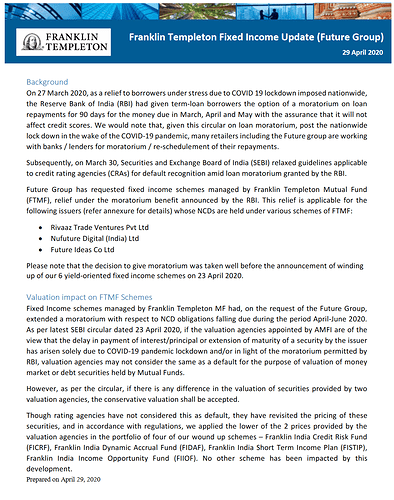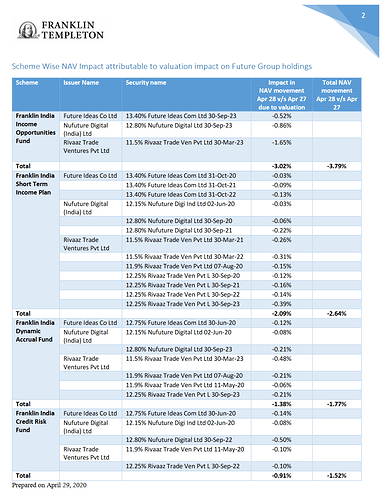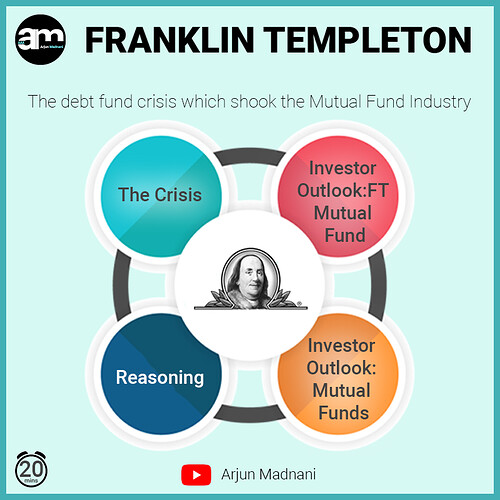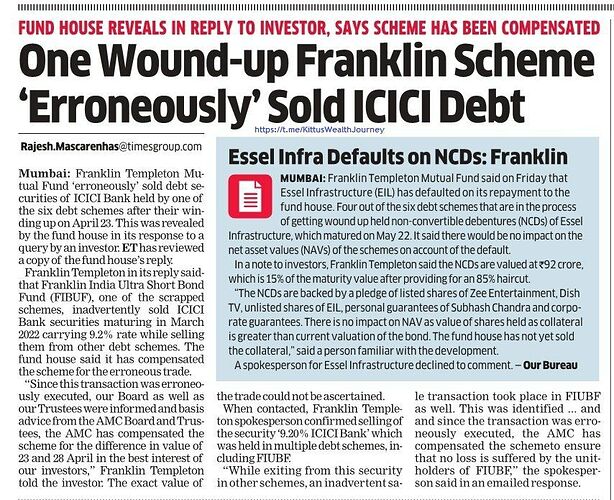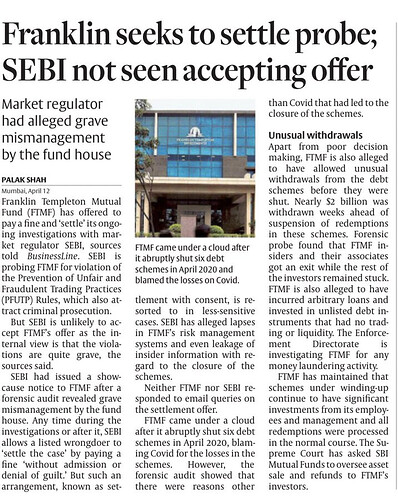Yes. That’s very unfortunate, I listened to the close hour 1 hr call FT had with about 5,000 folks (distributors I guess) after the freeze. All the top brass were there and quite down to earth, but it was too much corporate speak, and no QnA because of number of participants.
All FT funds were credit risk funds. And in 25% of cases, they were the sole subscriber to corporate bonds issued by some firms. Most of these are illiquid bilateral loans masquerading as securities. There’s no public market for them.
Someone on twitter was claiming their advisor switched them out of this fund just in time. I asked them how did they get the hint and I got no answer. May be this conference was the hint. Is this the cost of going direct versus an advisor?
Is there any impact on the equity side of FT as well?
I am heavily invested in the equity mutual funds of FT.
The strategy followed investing in AA and below, entities unknown ( may be big names behind it), false assumption that biggies cannot allow default. Why? to get more returns. This one and interest rate risk went against. Further they have wrongly calculated credit spreads ( read this along with interest rate risk). But retail/HNI guys should have got out the moment return turned negative that too for a debt fund. We don’t know yet whether this has happened due to liquidity or credit risk or both.
Now two important factors here Liquidity and Credit risk. 50000 crs today by RBI for liquidity. Unknown factor how many funds are affected by liquidity and credit risk and what is the composition in each fund. If it stops with liquidity fine and if it is credit, mayhem then.There is no single cockroach in the cupboard - WB. This calls for a big analysis of all the funds which followed similar strategies then only one can know the magnitude and we can come to some conclusion.There is no word HOPE. Get out of all funds which are in negative return as of today. The smarter would have exited long back by seeing negative return of FT and credit spreads expanding. Credit spreads expand - liquidity and a possible default
How many HNIS/Advisors have circle of competence. Another possibility, these HNIS would have given these units as margin for their FNO in NSE. Margin value is zero now.
It will be interesting to see if FT uses this liquidity window. If they are confident of paper giving back money they should isint it?
Moot point is whether banks accept the paper as collateral and use the funds from RBI. Some of the liquid and good rated bonds, would have been already liquidated by majority of the debt funds facing redemptions so RBI move might be confidence building measure but how much is the ground impact is to be seen.
Now they have granted moratorium to some companies from the Future group.
Hi. I prepared a video covering this topic, mainly for investors in these 6 funds and in mutual funds overall. You can give me your review on it.
YouTube Link: Franklin Templeton Mutual Funds Closure Crisis - YouTube
The unfortunate saga of FT Debt funds continues.
The 6 schemes are supposed to be listed on stock exchange as per latest SEBI instructions to provide an exit to unit holders. Need to see when it will actually happen.
Franklin MF sees Rs 616 cr default from Essel Infra in four schemes
Update from FT:
franklin-templeton_update-on-essel-infraproject_22_may_2020.pdf (333.9 KB)
Hi @rkirana,
I hope you will excuse this interjection, but I’m not sure what this sentence means. I was curious, so did a little checking, and Sumant Sinha and Jayant Sinha are both sons of Yashwant Sinha, per Yashwant Sinha’s Wikipedia page. (These people are a good illustration of how privileged Indians do well for themselves.) Your sentence suggests that Sumant Sinha is the son of Yashwant Sinha and Jayant Sinha.
One would assume that Renew Solar Power is a subsidary of Renew Power, but a quick search doesn’t show an explicit connection between them. Did you find something?
- 24th October: Finally, the judgement is out and it categorically highlights that investor is the king. The Karnataka High Court (HC) stated that unitholders’ consent should have preceded the announcement of winding up. From this perspective, the trustees of FT have been in violation of SEBI provisions.
- HC restrained trustees from taking any further actions till consent of unit holders is obtained. Further, HC stayed the operation of the judgment for a period of 6 weeks, during which neither investors can redeem, nor the AMC can make any borrowings.
- Thus, it remains to be seen what further actions the investor community will take and how the AMC pursues after the 6-week period.
For the unitholders, its a bad decision as they can’t get any amount from the existing collected amount of ~8k cr. and also bear the pain of interest cost on the existing borrowing.
This decision could have been better, if court say to Franklin that they should pay the principal amount to the investors from their pockets.
Isnt it strange enough that a private company can dial ambassador of a country and demand how regulator should deal with its case?
Not all. This is how the biggies twist every channel. Have you not seen Enron or Union Carbide? This is the familiar method.
BTW/// FT tried ‘settling’ the SEBI probe, with a modest fine, as per another news item
Link to original article by PrimeInvestor :

